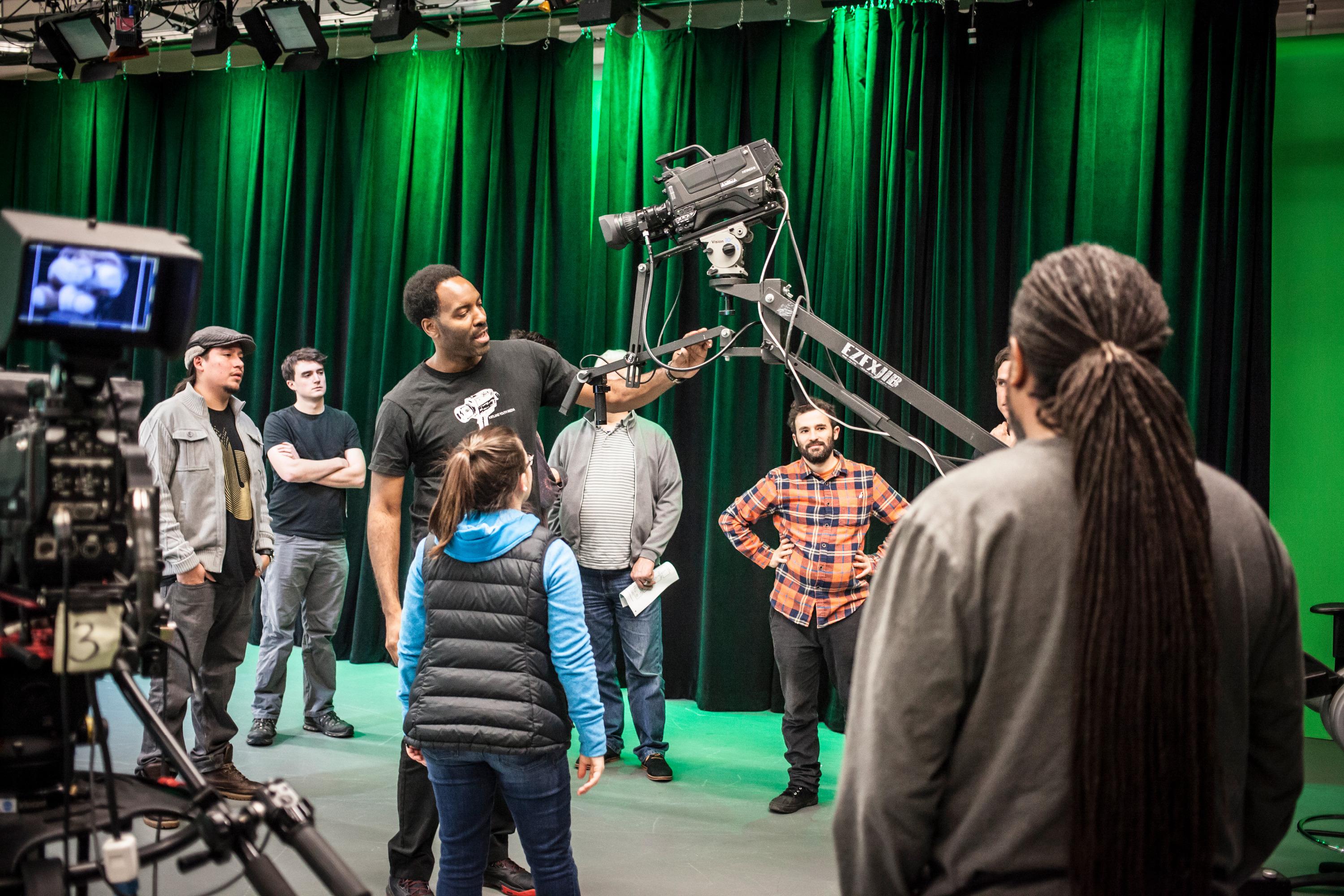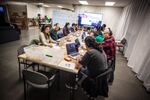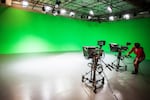
Open Signal has one of the few green screen studios in Portland, and it's available to anyone with the proper training and an idea.
Courtesy of Open Signal
From “Wayne’s World” to “UHF,” public access television often seems to serve more as a satirical punching bag than a respected media form. But that’s about to change.
Portland Community Media is renovating its building and rebranding itself as Open Signal, a media arts center where you can learn not only TV, but storytelling, podcasting, coding, mixed reality, and other forms of digital media. They're celebrating the transformation with an open house that will include demonstrations, interactive installations and more on Feb. 25.
“The fact that the city has this asset, where anybody can come off the street, for practically free of charge, and learn how to tell a story,” said Justen Harn, “it is amazing.”
Harn was part of the team that transformed the Hollywood Theatre from a dilapidated, second-run movie house into an innovative cinema and community hub. He was hired as the executive director at PCM a year ago with the instructions to create a more global vision for the organization, focused on programs, equity, and the future. With a budget of roughly $2.5 million drawn mostly from fees paid by cable service providers, PCM oversees five cable stations that serve an audience of 2.5 million.

Open Signal offers classes in everything from animation to camera operation to post-production — every step in the digital storytelling process.
Courtesy of Open Signal
With the blessings of the Hollywood, Harn brought his whole team and the theater’s innovative educational programming to PCM, along with some of the area's star arts leaders, increasing the size of the organization by 30 percent (to say nothing of the vintage trailer-turned-podcast studio Stream PDX in Open Signal's parking lot — listen to a
separate interview with its director, Tyesha Snow
).
Harn gave us a tour, along with the director of strategy and development, Rebecca Burrell, who signed on to work with Harn from her post as the head of the Right Brain Initiative at the Regional Arts and Culture Council.
Here are highlights from our conversation.
On What It Means To Shift From A Public Access Organization To A Media Arts Center:
Harn: "Historically we've been a spot where folks can come that are in the know and create productions. And we feel now, given what's transpired nationally and globally, that we need to be much more hands-on in ensuring that folks have the access to technology and also the skills to be able to communicate in visual ways that will drive action.
"So, in addition to the classes we’ve held, we’re doubling down on our youth education classes, and that’s across media as well, so transcending just film and video but thinking about coding, thinking about media theory, thinking about various things that we hadn’t really included previously. And also opening up our space to exhibitions as well, like having very kinetic sculpture in the lobby that is presented equally alongside a moving image work."
On How Today’s Political Climate Hearkens Back To The Birth Of Public Access:
Harn: "The political climate that we're entering into is similar to that which birthed this move in the first place. Folks were coming back from the Vietnam War completely changed — folks drafted into service against their will. And here we are again. We all feel a little out of control right now. So where we're at right now is: let's get back to where we started. Let's get back in touch with the ragtag group of artists, educators and activists that made this all possible. The time is now to demonstrate how effective a medium this can be. And our objective moving forward is: we're tasked with elevating the platform, getting it to a place where it's considered a respectable platform for journalism, conversations, entertainment, the arts, all that good stuff.

Producers use Open Signal's Cyclorama green screen for everything from music videos to mixed reality projects.
Courtesy of Open Signal
"We have classes where anyone can come in off the street and learn the principles of protesting, organizing, fact checking and journalism. We are also open a lot more than we were previously, for producers, and we have a whole gamut of experimental and exhibition programming on the docket and just an ongoing diversification of classes. I think that folks will find that we aim to be an extremely responsible organization. When a need is unveiled, we will do everything in our power to ensure that we’re able to be part of the solution."
On Why Rebecca Burrell And Other Staff Followed Harn To Open Signal:
Burcell: "Everyone at PCM knows what Justin has done at the Hollywood theater. Everyone knows that he was able to spearhead this really dramatic transformation. So we all knew when he took this job that something really incredible was going to happen at this organization, and I think a lot of us wanted to be a part of it, so I'm really lucky to be a part of that team.
"I think Justin comes to this organization with a fundamentally different perspective on the role of media within society. So coming from the arts community and bringing his entire team with him from the Hollywood theater, and then adding a couple of staff that have come over from RACC, we are really seeing our organization as more than a function to document and communicate. This notion of coming to Open Signal to creatively inspire and experiment and interact with other artists and be part of the community is really quite new for this organization. So we’re able to really honor the creative aspects of media making just as much as we honor the technical and social change aspects of the work we’re doing."
On What’s Special About Open Signal's Programming:
Burrell: "These shows are very personal for people. That's what it comes down to. There's religious programming, there's programs about people dealing with disabilities. The people who use the space really depend upon the services: the shows they create are really more than a hobby. We have $650,000 worth of equipment in our media library that we loan out to the public for free, from a $200 microphone to a $17,000, high-quality, professional camera. There's just nowhere else in the city to get this kind of service. So it's a small group, right now, I would say. Part of what we're here to do is to grow our community.
"I think something I’d love to be able to tell people is: this is an open invitation for creative folk, and folks who have never picked up a camera before, but who feel they have something to share — this is a place for you. This is a place for anyone to come, regardless of skill level, to tell stories and to share, to get to know community members, to engage more directly, to have impact on local politics, and to create amazing work."

